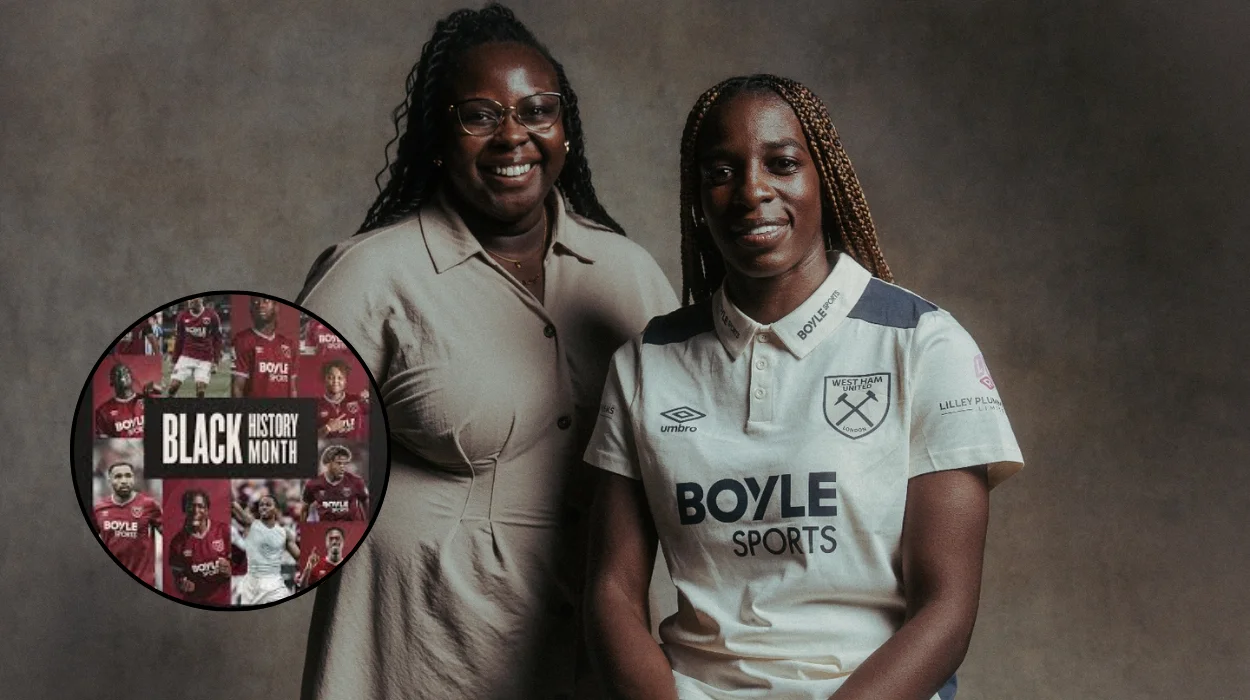Key Points
- West Ham United marks Black History Month 2025 with a series titled Discovering, focusing on players’ backgrounds and heritage.
- The fourth episode features Viviane Asseyi, a French Gabonese footballer, hosted by Goaldiggers podcaster Philippa Jennings.
- Asseyi discusses her upbringing in Quevilly, early football passion, and move to Clairefontaine at 14.
- She reflects on maintaining connections to family and Gabonese culture while pursuing her football career.
- Asseyi praises West Ham United’s welcoming environment and highlights support from teammates such as Hawa Cissoko.
- She shares her admiration for role models Serena Williams and LeBron James.
- Asseyi expresses plans to contribute to football development in Africa.
- She comments positively on being a Black woman in the WSL and representing Black women on the pitch.
What is West Ham United’s Discovering series for Black History Month 2025?
West Ham United is commemorating Black History Month 2025 through a new series called Discovering, which shines a light on the diverse backgrounds, heritages, and experiences of its players. The club aims to celebrate their journeys and the unique paths that have led them to east London. Philippa Jennings, a lifelong Hammer and award-winning Goaldiggers podcaster, hosts the series.
- Key Points
- What is West Ham United’s Discovering series for Black History Month 2025?
- How did Viviane Asseyi describe her childhood and early football experiences?
- What was Viviane Asseyi’s experience moving to Clairefontaine at 14?
- How does Viviane Asseyi stay connected to her family and Gabonese heritage?
- Who welcomed Viviane Asseyi at West Ham United, and how does she view the club’s environment?
- What challenges did Viviane Asseyi face growing up Gabonese in France?
- What cultural elements does Viviane Asseyi cherish most from Gabon?
- What advice does Viviane Asseyi give to young girls pursuing football?
- Who supported Viviane Asseyi’s footballing ambitions besides her mother?
- Who were Viviane Asseyi’s role models growing up?
- Why did Viviane Asseyi choose football over tennis?
- Where does Viviane Asseyi feel most at home among the places she has lived?
- Is Viviane Asseyi planning to expand her cultural or community engagement?
- How does Viviane Asseyi view her role as a Black woman in the WSL?
In the fourth episode, Jennings interviews Viviane Asseyi, a noted French Gabonese female footballer currently playing for West Ham United. The full interview is available on Spotify for listeners seeking deeper insights.
How did Viviane Asseyi describe her childhood and early football experiences?
Speaking to Philippa Jennings, as reported by West Ham United, Viviane Asseyi reflects warmly on her upbringing in Quevilly, France. She recalls a childhood filled with football, saying,
“I’m so thankful because where I grew up, football was everywhere. When I got home from school, I had to do my homework, my Mum never let me go until I’d done it, but my friends and I would just be playing football all of the time.”
What was Viviane Asseyi’s experience moving to Clairefontaine at 14?
Asseyi recounts her move to the prestigious Clairefontaine academy in Paris at age 14 as a significant milestone. She told Jennings that receiving the letter confirming her acceptance brought tears to her family.
“For them, it was hard, but I didn’t realise I would be away, I was just focused on football and so happy. I knew that I would come back every weekend, so I was so happy to go.”
She credits this move with shaping her into the woman she is today, supported throughout by her family.
How does Viviane Asseyi stay connected to her family and Gabonese heritage?
Asseyi emphasises the importance of family support, particularly from her mother who raised her alone after her father left.
“We’re always on the phone. She helps me when I have my down moments and my good moments.”
She also acknowledges the friendships football has brought her, which offer mutual support despite missing important life events due to her career.
Regarding her Gabonese roots, Asseyi fondly remembers the cultural richness of her upbringing:
“When I grew up, there was a lot of Gabonese, African music every day. Every Sunday we would eat with all the family, with music from midnight to midnight.”
She stresses the value of never forgetting one’s origins.
Who welcomed Viviane Asseyi at West Ham United, and how does she view the club’s environment?
As reported by the club, Asseyi describes West Ham as a “family Club” where everyone made her feel welcome upon arrival. She highlights Hawa Cissoko, a teammate she had played with before, as a key figure in helping her settle. “I had a really good welcome here.” She also notes the club’s supportive culture towards new players, citing Manuela Paví, who faces linguistic and familial challenges, as an example of why mutual support is important.
What challenges did Viviane Asseyi face growing up Gabonese in France?
Asseyi reports a positive experience:
“It was good. In France, there’s a lot of culture and also a lot of Gabonese people.”
She recalls the constant presence of Gabonese and African music and food, which reinforced her cultural identity.
What cultural elements does Viviane Asseyi cherish most from Gabon?
Asseyi’s favourite aspects of Gabonese culture are food and music. She particularly enjoys rice and plantain dishes prepared by her mother, joking that despite the diet being unusual for a professional athlete, they “give you the strength to run every day!” Music is also very important to her, with diverse playlists and a noted enthusiasm, especially among her teammates.
What advice does Viviane Asseyi give to young girls pursuing football?
In the interview with Jennings, Asseyi encourages perseverance and self-belief:
“Follow your dreams. Believe in yourself. Don’t listen to people who say, ‘You’re not good enough’.”
She recalls childhood moments inspired by France winning the 1998 World Cup when she asked her mother for a football amid scepticism.
“I knew I would always work for that… every day I’m fighting for it.”
Who supported Viviane Asseyi’s footballing ambitions besides her mother?
Asseyi credits her extended family and friends with encouragement throughout her journey.
“All of my Uncles, Aunties, they grew up with me. They pushed me a lot.”
She also values the support of friends who shared the testing phases for Clairefontaine and still celebrate her wins virtually.
Who were Viviane Asseyi’s role models growing up?
Serena Williams stands out as a major inspiration for Asseyi. She praised Williams’ relentless mentality, noting she “never gives up” regardless of external opinions. LeBron James is another admired figure, symbolising dedication and hard work. These role models shape her attitude toward challenges.
Why did Viviane Asseyi choose football over tennis?
Asseyi explains that although she enjoyed tennis, football’s team-oriented nature drew her more.
“I’m someone who likes to be with other people, sharing. Football is your performance, but you share so many things with other people.”
Where does Viviane Asseyi feel most at home among the places she has lived?
Although she has played in France and Germany, Asseyi says she loves London most. She describes playing in France as natural since it is her home country, but London captivated her upon arrival. The only drawback she mentions is the weather.
Is Viviane Asseyi planning to expand her cultural or community engagement?
Yes, she and her family are considering initiatives in Africa. She candidly shares:
“I’ve never been there, which is crazy! We’re looking to do something big there next summer… like creating a football pitch or something like that.”
She feels a responsibility to give back, especially after learning about the strong support for her games in Gabon.
How does Viviane Asseyi view her role as a Black woman in the WSL?
Asseyi feels positive about her position and the progress she sees in the Women’s Super League. She states,
“When I arrived, it was one of the first things that I saw because I can compare it with other countries and you feel valued here.”
She also notes that while other places are beginning to address racial representation, the WSL is a leading example. “It’s important people feel understood.”



